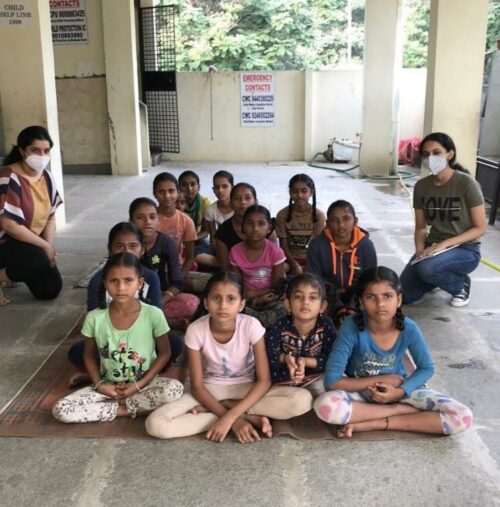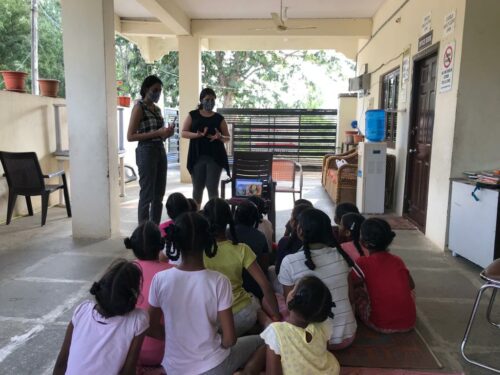Ananya Talluri of Hyderabad was diagnosed with an iron deficiency at the age of 15. But with an understanding of nutritional requirements and access to proper medication, this student of CHIREC International School was able to resolve her problem within a few weeks.
In 2019, the socially aware youngster began volunteering at the government schools of her city. This was when the contrasting lack of knowledge and resources among the underprivileged hit her hard.
“The meals provided to the students at these schools were barely sufficient. The dal would be excessively watery, and they’d barely get any rice. They barely possessed any knowledge of what they should be consuming or not, and so failed to demand a fair share of nutritional food,” shares the 17-year-old.
Of the total fatalities in India 0.5 per cent were attributed to deficient nutrition in 2016. Anemia (caused by a deficiency of iron) alone was diagnosed in 69 per cent of children below the age of five. Among adult females, this percentage persisted at an astounding 55 per cent. It has been widely recognised that undernourished women go on to birth undernourished babies; that at a great risk to their own health.
In light of the on-ground situation, Ananya decided to trigger change under her campaign ‘Svaasthya’, with her friend Anvitha. They work on the education and nutritional development of female children in their city.
Today, a total of 120 young girls have successfully reached their nutritional goals, while the duo work with another 127. These are children who now understand the concept of health and are equipped to help themselves in the future.

Tailored Nutrition & Care
The duo then finalised the technicalities of the project. They began understanding the nuances of undertaking such an initiative under the opportune mentorship of Future Leaders programme being conducted at their school.
However, schools closed down due to the onset of the pandemic. But this did not deter the driven youngsters from finding another way.
The two began getting in touch with orphanages in the city. As teenagers, it was tough to be taken seriously in the beginning. Many institutions would turn them down, while others would offer nothing more than monetary assistance.
Finally, they were able to collaborate with an orphanage for girls and Shishu Mangal Orphanage Home.
“Under this campaign we diagnose the nutritional deficiencies in young girls through blood tests. An agreement was then signed with the orphanages for conducting these tests and the process began post haste. We get a Complete Blood Picture (CBP) and serum iron test for each child along with a height and weight check,” Ananya tells The Better India.
The test reports are analysed by Anvitha’s father, who is a doctor at CARE Hospital in Hyderabad.
The social worker adds, “Every child has a different requirement, and a blanket multivitamin cannot assure the health of all. Upon his prescription, individual packets of relevant supplements are made for each girl and given to the caretaker for administration.”
A meticulous approach has helped the girls keep track of multitudes of children over the course of 15 months. All data is personally maintained by them on Excel sheets. Regular follow ups are conducted to ensure that the prescriptions are followed.
Going beyond their duty, these girls use the follow up sessions to educate the girls about nutrition, menstrual health, and the role of a proper diet through interactive conversations. The orphanage is also provided with essential foods to meet the basic dietary requirements of a growing child.

Age proves no barrier in their understanding of the socio-cultural chasm that divides accessibility in India. “We try to teach them about simple foods like pulses, rice, etc. We know we cannot provide the underprivileged with superfoods as of now, but we try to equip them with the understanding about how to gain the most nutrition out of easily available foods like pulses, rice, breads, etc,” she says.
After a period of three to four months, a second round of tests is conducted. This measures the impact of the regimen and charts out the plan of action going forward.
To make this possible, the duo was able to raise Rs 80,000 from friends and family to buy groceries and other essential items. A fundraiser event has been premeditated for when the need arises.
These conscious efforts recently won Ananya the prestigious Diana Award that honours young leaders bringing positive change in the community. The project is also set to represent India at the Future Leader Summit and UN Headquarters in New York later this year.
“In the process, I have not only been able to help these young girls but also learnt life skills that I hope to employ in all my future endeavours. For instance, dealing with various orphanages taught me how along with a noble idea, it is just as important to know how to get your views across,” Ananya shares precociously.
Edited by Yoshita Rao
No comments:
Post a Comment